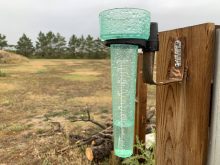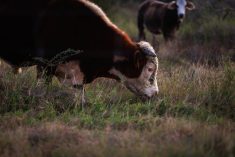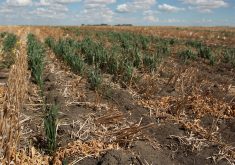Funds will come from the federal-provincial AgriRecovery, and administered by Saskatchewan Crop Insurance Corp.
Saskatchewan’s livestock producers are receiving drought support from the province and are hoping more funds will soon be on the way from the federal government.
The province is making up to $70 million available to help offset the “extraordinary costs” of feeding animals and maintaining breeding herds.
“Immediate measures are needed as farmers and ranchers deal with significant challenges due to drought,” said Saskatchewan Agriculture minister David Marit.
Eligible producers will receive up to $80 per head to maintain breeding stock for beef cattle, bison, horse, elk, deer, sheep and goats.
Read Also

Using artificial intelligence in agriculture starts with the right data
Good data is critical as the agriculture sector increasingly adopts new AI technology to drive efficiency, sustainability and trust across all levels of the value chain.
The money is flowing through the federal-provincial AgriRecovery program, a 60-40 cost-shared program. The program will be administered by Saskatchewan Crop Insurance Corp.
Keith Day, chair of the Saskatchewan Cattlemen’s Association, is thankful for the aid.
“Any assistance is welcome,” he said.
But some producers are going to require more to get them through the fourth or fifth year of drought on their farms.
“We look forward to a similar announcement from the federal government to provide their funding to ensure our producers get the help they need through these challenging times,” said Day.
Ray Orb, president of the Saskatchewan Association of Rural Municipalities, delivered a similar message.
“We are confident that the federal government is working together with the province to assess how they can provide additional support through AgriRecovery and look forward to seeing what that much-needed assistance will be,” he said in a news release.
Marit said the federal government has approved the province’s AgriRecovery assessment and that conversations with his federal counterpart Lawrence MacAulay have been “really good.”
“I respect the process the minister has to go through,” he said.
“We’re hoping that we hear from the minister soon.”
A similar program was offered to the province’s ranchers in 2021 in response to that year’s drought.
Marit felt it was important for the province to make the announcement as soon as possible because he recently spoke to 30 producers in the southwest corner of the province and many of them were already contemplating whether to downsize their herds.
Day said producers can find reasonably priced feed, but it is usually a long way away and it is expensive to haul it to the farm with today’s high freight rates.
He estimated that feed accounts for at least 50 percent of the cost of wintering cows.
But feed isn’t the only issue producers are facing. If there isn’t a serious rainfall in some areas before freeze-up, there will be no runoff to fill their dugouts come spring, he said.
Producers at a series of meetings organized by SCA said downsizing is already taking place in the south and west-central areas of the province.
“In the Cadillac area, several producers said they have cut back 40 to 50 percent already in their herd size,” said Day.
Marit said there was quite a decline in the province’s cattle herd in 2021 and he doesn’t want to see a repeat.
Farmers need feed receipts to be eligible for compensation. The program is retroactive to June 1, 2023, and will run through March 1, 2024.
It will also cover the costs of moving cattle to another source of feed. In that case, a trucking receipt is required.
“There has always been some cases where if the ranchers are out of feed, it is cheaper for them to move the cattle than it is to bring the feed,” said Marit.
He expects “quite a few thousand” producers will avail themselves of the program.
Producers may also be interested in Agriculture Canada’s recently announced Livestock Tax Deferral program for farmers in designated regions of British Columbia, Alberta, Saskatchewan and Manitoba.
The provision allows livestock producers who are forced to sell all or part of their breeding herd because of drought or excess moisture to defer a portion of their income from those sales to the following tax year.
“The income may be at least partially offset by the cost of reacquiring breeding animals, thus reducing the tax burden associated with the original sale,” the government stated in a news release.
There could be quite a few producers who are eligible for that program. Day worries that older producers are going to exit the industry because cattle prices have been quite good so far this fall.
He feels that would be a shame after attending the Canadian Beef Industry Conference where there was plenty of optimism about future demand for Canada’s top-quality beef.
“I would encourage younger producers, especially, to just try to hang in there,” he said.
“If they can see a way through this drought, hang in there until things get better.”
















